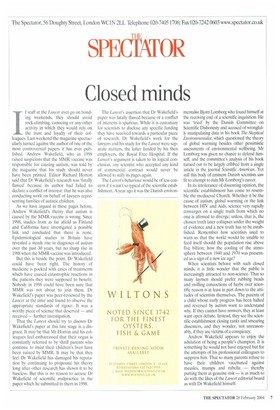Closed minds
iif staff at the Lancet ever go on bonding weekends, they should avoid rock-climbing, canoeing or any other activity in which they would rely on the trust and loyalty of their colleagues. Last weekend the magazine spectacularly turned against the author of one of the most controversial papers it has ever published. Andrew Wakefield, who in 1998 raised suspicions that the MMR vaccine was responsible for causing autism, was told by the magazine that his study should never have been printed. Editor Richard Horton said that Dr Wakefield's research was 'fatally flawed' because its author had failed to declare a conflict of interest; that he was also conducting work on behalf of lawyers representing families of autistic children.
As we have argued in these pages before, Andrew Wakefield's theory that autism is caused by the MMR vaccine is wrong. Since 1998, studies from as far afield as Finland and California have investigated a possible link and concluded that there is none. Epidemiological studies in Britain have revealed a steady rise in diagnoses of autism over the past 30 years, but no sharp rise in 1988 when the MMR vaccine was introduced.
But this is beside the point. Dr Wakefield could have been right. The history of medicine is pocked with cases of treatments which have caused catastrophic reactions in the patients they were supposed to benefit. Nobody in 1998 could have been sure that MMR was not about to join them. Dr Wakefield's paper was peer-reviewed by the Lancet at the time and found to observe the appropriate standards of rigour. It was a worthy piece of science that deserved — and received — further investigation.
That the Lancet should try to disown Dr Wakefield's paper at this late stage is a disgrace. It may be that Mr Horton and his colleagues feel embarrassed that their organ is constantly referred to by shrill parents who continue to insist their children's lives have been ruined by MMR. It may be that they feel Dr Wakefield has damaged his reputation by continuing to propound his theory long after other research has shown it to be baseless. But this is no reason to accuse Dr Wakefield of scientific malpractice in the paper which he submitted to them in 1998. The Lancet's assertion that Dr Wakefield's paper was fatally flawed because of a conflict of interests is spurious. While it is customary for scientists to disclose any specific funding they have received towards a particular piece of research, Dr Wakefield's work for the lawyers and his study for the Lancet were separate matters, the latter funded by his then employers, the Royal Free Hospital. If the Lancet's argument is taken to its logical conclusion, any scientist who accepted any kind of commercial contract would never be allowed to sully its pages again.
The Lancet's behaviour would be of less concern if it wasn't so typical of the scientific establishment. A year ago it was the Danish environ mentalist Bjorn Lomborg who found himself at the receiving end of a scientific inquisition. He was 'tried' by the Danish Committee on Scientific Dishonesty and accused of wrongfully manipulating data in his book The Skeptical Environmentalist, which questioned the theory of global warming besides other pessimistic assessments of environmental wellbeing. Mr Lomborg was given no chance to defend himself, and the committee's analysis of his book turned out to be largely cribbed from a single article in the journal Scientific American. Yet still this body of eminent Danish scientists saw fit to attempt to ruin Mr Lomborg's career.
In its intolerance of dissenting opinion, the scientific establishment has come to resemble the mediaeval Church. Whether it be the cause of autism, global warming or the link between HIV and Aids, science very rapidly converges on a single truth from which no one is allowed to diverge; unless, that is, the chosen truth later collapses under the weight of evidence and a new truth has to be established. Remember how scientists used to warn us that the world would be unable to feed itself should the population rise above five billion; how the cooling of the atmosphere between 1940 and 1970 was presented as a sign of a new ice age?
When scientists behave with such closed minds, it is little wonder that the public is increasingly attracted to non-science. That so many laymen should prefer rubbing beads and swilling concoctions of herbs over scientific reason is at least in part down to the attitudes of scientists themselves. The parents of a child whose early progress has been halted and reversed by autism want to understand why. If they cannot have answers, they at least want open debate. Instead, they see the scientific establishment closing ranks and smearing dissenters, and they wonder, not unreasonably, if they are victims of a conspiracy.
Andrew Wakefield appears to enjoy the adulation of being a people's champion. It is something he would not have enjoyed but for the attempts of his professional colleagues to suppress him. That so many parents refuse to have their children vaccinated against measles, mumps and rubella — thereby putting them at genuine risk — is as much to do with the likes of the Lancet editorial board as with Dr Wakefield himself.


























































 Previous page
Previous page